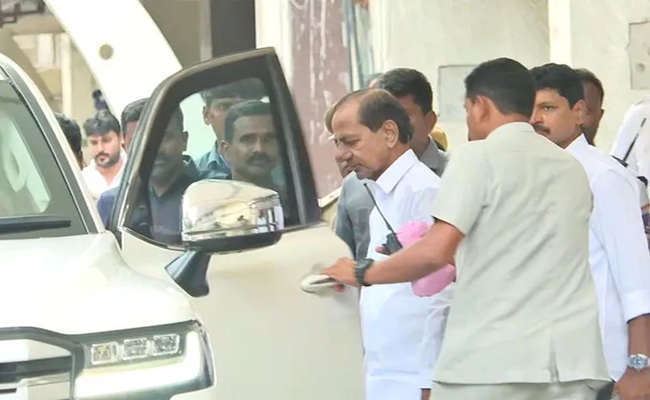
The much-hyped interrogation of Bharat Rashtra Samithi president and former Telangana chief minister K Chandrashekar Rao by Justice P C Ghose Commission, in connection with the alleged irregularities in the Kaleshwaram irrigation project, ended as a damp squib on Wednesday.
While BRS leaders created a huge uproar over KCR’s questioning — portraying it as if a major political earthquake had struck Telangana — the judicial commission reportedly extended VIP treatment to him during the inquiry.
Firstly, a large number of BRS leaders and workers gathered at Burgula Ramakrishna Rao Bhavan to protest against KCR’s questioning. The police remained mere spectators, unable to control the crowd.
Secondly, unlike other witnesses and accused who were questioned in open court under media coverage, KCR was granted permission for a closed-door, in-camera session due to health reasons, including a cold. The commission accepted his request and conducted the inquiry behind closed doors at BRK Bhavan.
Thirdly, unlike the lengthy grilling sessions others underwent, KCR's questioning lasted only about 50 minutes.
According to BRS sources, the commission posed 18 questions related to project re-engineering, formation of corporations, and cabinet approvals.
KCR submitted several documents to the commission, including the book Lifeline Kaleshwaram, which explains the project’s objectives.
KCR stated that all decisions regarding the project were made with cabinet approval.
He elaborated on the necessity of re-engineering, citing reports from WAPCOS and the Central Water Commission (CWC), which highlighted changes in water availability and other technical factors.
He denied issuing any direct orders regarding water storage levels in the barrages, stating that such decisions were made by engineers.
When asked whether he instructed water retention levels, KCR clarified that the barrages were built only to lift water, and he did not interfere in technical decisions.
He further explained that the project location was shifted from Tummidi Hatti due to objections from Maharashtra and upon recommendations from a technical team suggesting the construction of three separate barrages.














